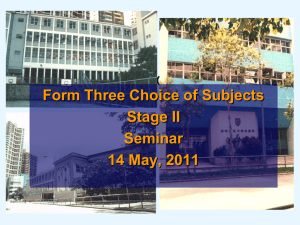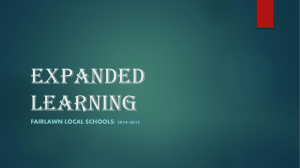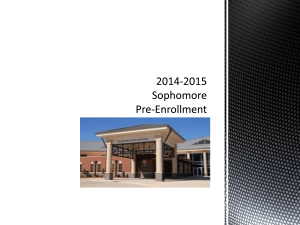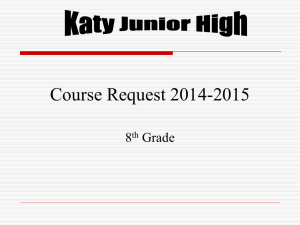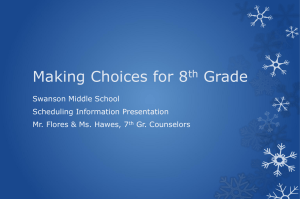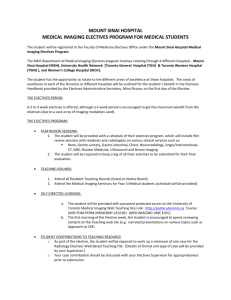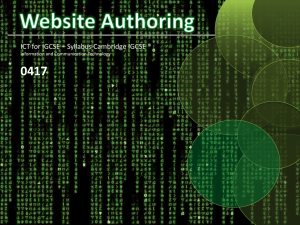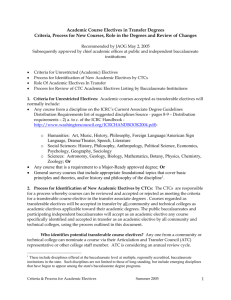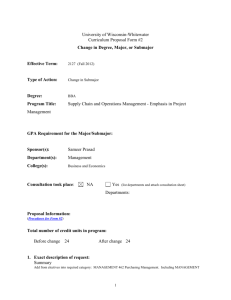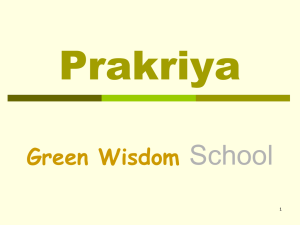optional & elective
advertisement
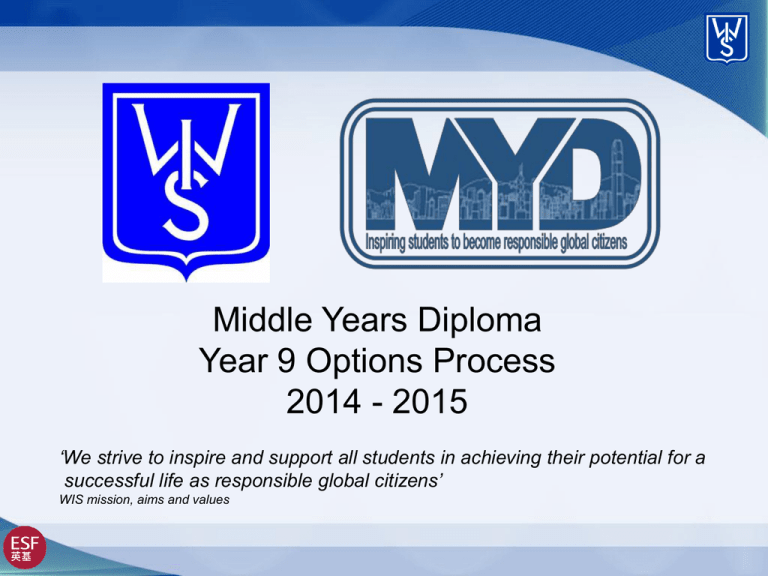
Middle Years Diploma Year 9 Options Process 2014 - 2015 ‘We strive to inspire and support all students in achieving their potential for a successful life as responsible global citizens’ WIS mission, aims and values Aims • To gain an overview of the options timeline and related process • To gain an understanding of the Year 10/11 learning experience - CORE, OPTIONS AND ELECTIVES Option Process Timeline Oct 30 Options booklet available on website Oct 30 Parent Forum Oct 27 Dec 16 Tutor follow up Nov 20 Options Evening Nov 21 Dec 5 On-line choices made Dec 16 April Parents’ confirm choices Final option choices confirmed Broad and Balanced A CORE of compulsory courses The Year 10 and Year 11 learning experience A set of OPTIONAL & ELECTIVE courses English Language and Literature Languages Maths The CORE or compulsory courses Global Perspectives Science Physical Education non examined Learning for Life non examined Option Group A Choose one subject from I&S 35 COURSES TO CHOOSE FROM Option Group C Choose from The Electives or another subject from Option Groups A and B or additional language Option Group B Choose one subject from Technology, PE or Creative Arts The Options and Electives The Electives- What are they? Internally devised or externally accredited courses that can be completed during: • one to two terms • a year • two years of study. What are the benefits? The Electives embody the essential transferable key skills that run through the Middle Years Diploma Programme and the IB/ID programme at Post 16- • • • • • Communication Research Social Thinking Self-management Elective choices allow for : extension, challenge, support and/or enrichment alongside the IGCSE courses Why choose the Electives? What is the appropriate number of (I)GCSEs required for life after WIS? • The UK’s leading research universities (the Russell Group) that 9 or 10 (I)GCSEs certificates is the maximum desired number for study by students in Year 10 and 11. Skills and qualities that companies are looking for within the 21st century workplace… • Flexibility • Ability to innovate and invent • Entrepreneurial mindset- to think laterally and spot opportunities • An awareness of presentation and how to communicate ideas • How to build relationships Taken from STEM report –Inventing the Future 2012 ‘Firms need young people that are resilient, good communicators and understand how to work as part of a team.’ John Longworth, Director General of the British Chambers of Commerce (BCC) Graduates are often very good at their own specialism, but are unable to develop ideas laterally across specialisms, often due to inexperience. We need people who can think in an innovative and strategic way across different aspects of the business.’ Inventing the Future,NEF,Pg25 Elective courses 2015-16 (Due to the demanding nature of the AS Critical Thinking course, students will be invited to consider this Elective) How are the Electives benefiting our students? Sports leadership ‘I've learnt many things during this course that will definitely help me in my future whether I'm a sports coach or not. I enjoyed the challenge of learning how to deal with different students who have varying ability and social skills.’ ‘Sports leadership has and will help me be able to adapt to my surroundings. My communication over the past few weeks has definitely changed, I feel more comfortable talking to large groups, and giving praise to students. My personal organisation has developed massively and this is something that will serve me well throughout school, university and even the work place’. All the skills that we gain in this course will help us in our future careers because communicating with people is the basis of a good relationship in workplaces or just socially’. I have learnt how to properly assess my skills and improve others; I developed my confidence and team working skills, which helped me in other subjects including Drama. I was able to develop my risktaking skills by taking a leadership role. This course has helped me develop many skills in enterprise including creativity, team work and leadership. Also it helped me realised how to start business. Business and enterprise skills Things to consider Electives or doubling up • Electives or another course from option group A or B Languages as an • Chinese, French or Spanish additional option Which science course? Additional support Your future in Year 12 and 13 • Triple award, Double Award or Combined Single Science Award • For example, Strategies for School, English as an Additional language • IB or ID programmes Reasons for choosing a course … because you enjoy it because you are good at it because you are interested in it because you want to challenge yourself because it might be useful for the future course or career you have in mind Reasons you should not choose a subject… because your friends are doing it because you hope to have the same teacher as this year because it is easy Personal Interest and Choice Option choice form for Years 10 and 11 Option group A Select an I&S subject Option Group B Select one from Technology, Creative Arts or PE Option Group C Select the Electives pathway and identify your preferred course or combination of courses Or Science Triple, Double or Combined Single Science Award Select another subject from option groups A or B or another language To achieve breadth and balance the following subjects must not be chosen together… • Business and Economics • Two Design Technology subjects such as resistant materials and graphics • Business with Enterprise skills from the Electives SCIENCE at W.I.S. TRIPLE SCIENCE 3 separate science IGCSEs Biology, Chemistry, Physics. DOUBLE SCIENCE 2 science IGCSE certificates. Grades awarded on the average attainment over 3 sciences. SINGLE (+ Applied) SCIENCE 1 iGCSE Year 10 Science course • Triple science and Double Science students do the same course in year 10 are mixed – no split until year 11. (Some differentiation in lessons) • Students taking triple science will typically be working at level 7 or 8 in science in year 9. Double Science Biology core exam Chemistry core exam + + 2 X SCIENCE iGCSE (example: science BB) Physics core exam TRIPLE SCIENCE Biology core exam Chemistry core exam Physics core exam + + + Biology extension exam Chemistry extension exam Physics extension exam = Biology iGCSE = Chemistry iGCSE = Physics iGCSE SINGLE SCIENCE • 1 GCSE , plus internally assessed applied science units similar to previous BTEC course. • Aimed at Foundation level C to G grades • Typical student will have MYD 5 (approx below 60% in science summative testing) • Does NOT prepare adequately for IB sciences Biology, Chemistry and Physics HL or SL • OK to do ID or full IB taking ESS, Sports Science or Design in group 4. Discussions with tutors and Learning for Life teachers Discussions with teachers and heads of subject Discussions between parents and students Students complete online options by December 5th and return printout with parents’ signature to school by Dec 16th.
